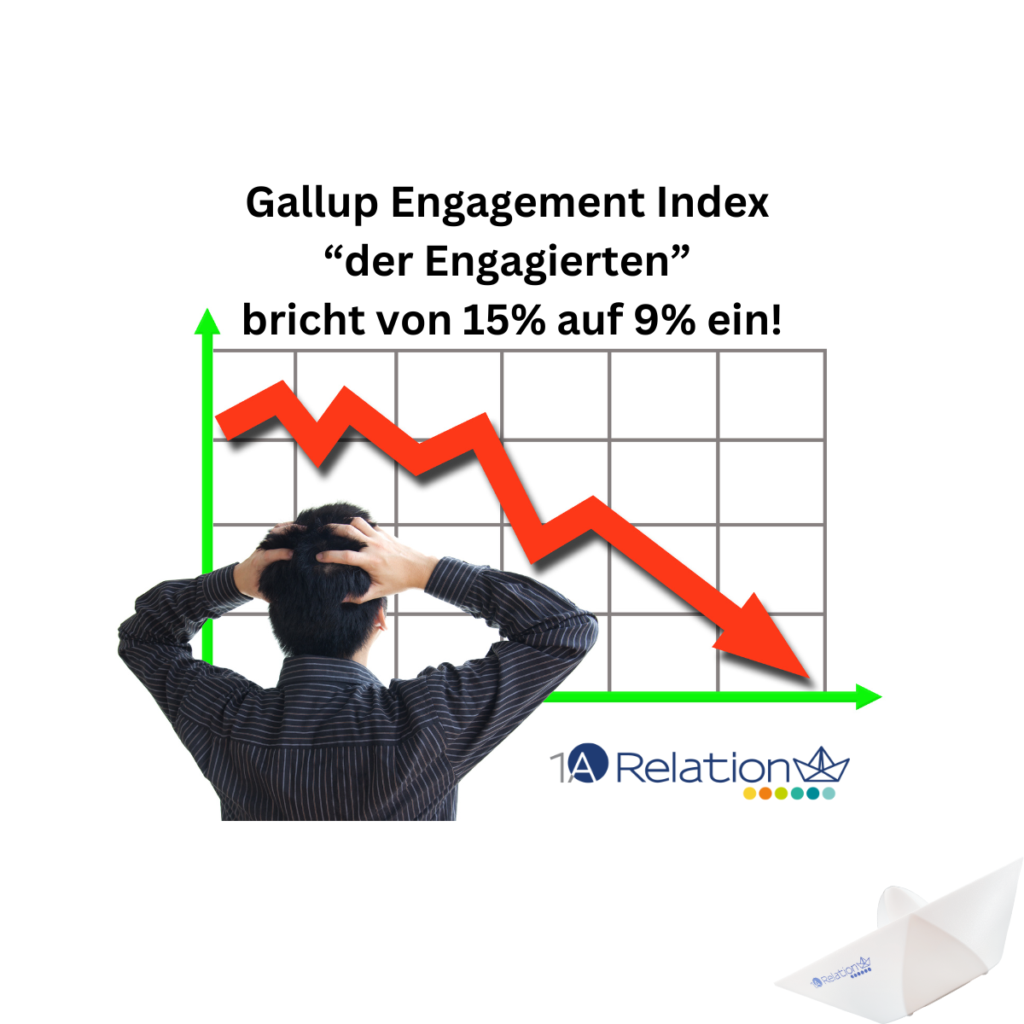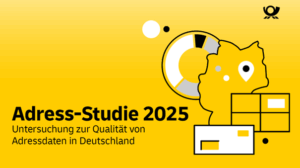Gallup Engagement Index collapses: I have been following this engagement index for well over a decade. It all started when I was allowed to teach HR management at university alongside CRM and sales policy.
I always told my students: remember 15 – 70 – 15, these are not the ideal measurements of some beauty ideal. No, these are the (average) figures (of recent years) that have long been regarded as a benchmark:
- 15% of employees are committed
- 70 % are more or less involved
- 15 % have resigned internally.
But now, in the 2024 measurement, the proportion of committed employees has collapsed. From 15 to 9 percent. And that is fatal. In more ways than one. Here is the link to Gallup and the results.
Gallup Engagement Index collapses – What this means in the context of CRM, customer management and other aspects in a nutshell:

The source is www.Gallup.com see also the link to the study. At the end of the article is the overview from 2006.
1) Record low in emotional loyalty – also with consequences for customer relationships
Only 9% of employees are still highly emotionally committed – a historic low. 78% work to rule, which can have a direct impact on service quality, customer focus and innovative strength.
Companies therefore risk massive losses in customer satisfaction and loyalty if employees act in an emotionally distant manner.
2) Loyalty and trust in decline
Only 50 percent of employees still want to be with their current employer in a year’s time, in three years’ time it will be just 34 percent. trust in the financial future of the employer and in managers is falling massively – a dangerous mix for sustainable customer relationships.
The loss of trust within the company can also be transferred to customers on the outside.

3) Economic damage due to lack of motivation
Gallup does the math: Productivity losses due to “internal resignation” cause costs of up to 134.7 billion euros per year.
Companies with high employee retention show, among other things
10 % better customer ratings 18 % higher productivity (sales) 32 % fewer quality defects
4) Leadership culture as a lever – but still with deficits
Leadership is currently often only functional (risk minimization) instead of inspiring (motivation and development).
Only 16% of employees are still completely satisfied with their manager.
Good leadership and a focus on strengths increase emotional loyalty and therefore also customer orientation: employees who are able to use their strengths are eight times more likely to be highly emotionally committed.
5) Home office – ambivalent balance
Teleworking is established, but cooperation, creativity and reflection often suffer as a result.
The office remains an important place for innovation, culture and customer orientation.
Companies must actively shape hybrid forms of work with clear communication and participation strategies – also with a view to customer processes.
6) A small ray of hope for “internal resignation”
Proportion of internal resignations falls from 19% to 13% – measures to combat demotivation are having an effect.

Employee loyalty is customer loyalty
Gallup Engagement Index collapses – So what?
I said at the beginning that this was a fatal sign. Why? Because (I’ll round up the 9% and say) 10% of employees are pulling the cart, i.e. the company. This leads to overwork, wear and tear, less customer focus, less innovation, etc.
A company needs its well-trained and motivated leaders who are also “in good shape”.
The opposite should be the case.
Instead of (as before) approx. 15% committed employees, this figure should rise to 17 or even 20%. That would be an enormous gain for everyone. Because the more “pulling the cart”, the lighter the burden for the individual. That is clear to everyone.
As a result, the latest measurement means in plain language:
Without strategic measures to actively retain and create meaning, the potential of customer orientation remains untapped.
My motto has been for years: Employee loyalty is customer loyalty. More than ever.
Strengths-based leadership, trust, a culture of feedback and clear communication are crucial for high-performing teams – and therefore also for excellent customer relationships.
If the external framework conditions are complex and difficult (and are likely to become even more so), then at least internal stability and a good community should ensure continuity and resilience.
Conclusion – especially from a CRM and customer management perspective:
The results clearly show that if you want to retain customers in the long term, you have to start with your own employees.
Emotionally committed employees ensure more satisfied customers, better ratings, fewer errors – and are more loyal. CRM starts with employee retention.
Every employee lost and every new employee gained causes unnecessary costs, sometimes frustration among colleagues and managers, delays in day-to-day business and projects … This doesn’t have to be the case.
Gallup Engagement Index collapses: How do you rate these parameters?
Are you over 15% engaged? One would hope so.
Just measuring or determining the parameters would be important. Only then can management react accordingly.













